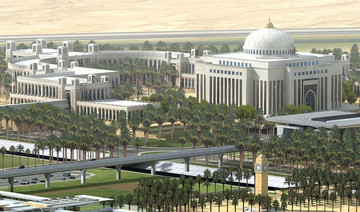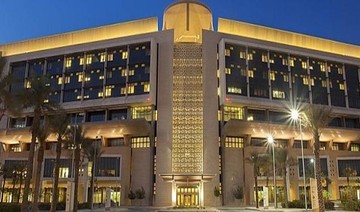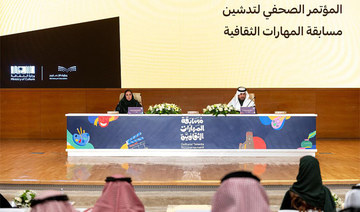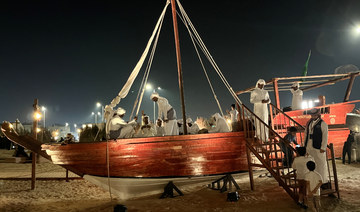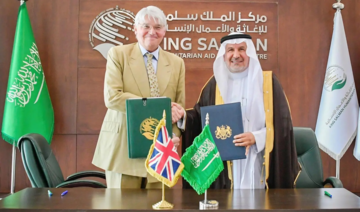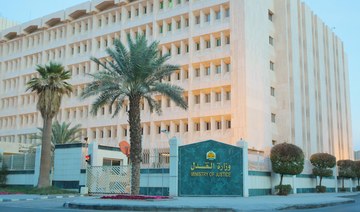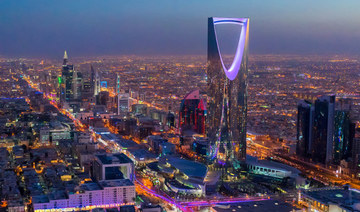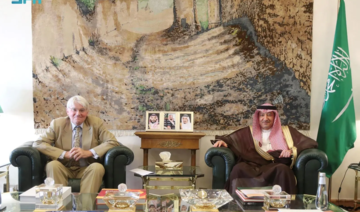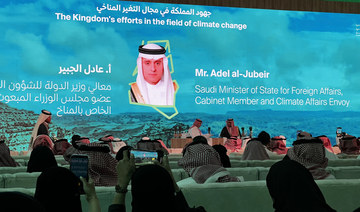JEDDAH: “As you return home, to your home, think of others, do not forget the people of the camps,” said Mahmoud Darwish in one of his most well-known poems, “Think of Others.” Darwish was regarded as the Palestinian national poet and lived between 1941 and 2008.
Fatimah Al-Bassam, 26 (@FatimaAlBassam) and Nouf Aburas, 28 (@Noufaburas) are two young Saudi women who were on a voluntary trip to Al-Azraq camp for Syrian refugees in Jordan when they decided to start a social business to offer a sustainable solution to help the refugees.
“The idea began in October 2017. We were in the camp on a trip organized by volunteering group and Care International,” Al-Bassam told Arab News.
It all began with a question. “The group’s guide from the camp asked us about the most significant problem the people suffered from at the camp. The volunteers gave several answers like hunger, poverty, lack of health care, but the true answer actually was idleness,” she added.
Al-Bassam said the refugees have been living in this situation for years. Their minimum needs, such as shelter, clothes, and food are usually met by relief organizations, but they have nothing to do but wait in their caravans or tents for time to pass.
The refugees are full of energy and enthusiasm but the opportunities are not there. “During the visit, I met a lady who told me that she graduated from a sewing course and has a certificate. She wants to practice her skill but she has nothing to do,” Al-Bassam said.
“I was thinking, they have people who are good at sewing. They have sewing factories, but they do not have the opportunities to work, and that’s what they need, a sustainable solution.”
Al-Bassam and Aburas joined in compassion for the refugees and co-founded the social development enterprise Jonnah store.
In addition to her full-time job, Al-Bassam is a member of a volunteering group that organizes trips, many of which focus on the refugee crisis. Aburas already has experience in a social enterprise to support women in Saudi Arabia.
They collaborated with Care International in Jordan (@CAREJor), one of the main humanitarian agencies in the camp.
Jonnah store (@jonnahstore) creates the right conditions to motivate the Syrian refugees to play an active role in alleviating the suffering of their society members, overcoming economic, social and cultural challenges, and enabling them to meet their primary needs of security, shelter, food, health and education.
This happens by giving refugees the opportunity to practice their skills. It is a store that sells minimal wear made by people at the camp and designed by fashion designers from Saudi Arabia.
“Jonnah” in Arabic means the shield. According to Al-Bassam, their store’s name is borrowed from a Hadith by the Prophet Muhammad (peace be upon him) in which he said “Fasting is a shield,” because it shields the believer from himself, from his wrongdoings, and from behaving foolishly and impudently.
“We want the Jonnah project to be the tool by which refugees protect themselves from hunger, thirst, and loneliness through the money they are making and the community that is being built,” said Al-Bassam.
“I have a social business in Saudi Arabia. I am interested in social issues, and poverty in particular,” Aburas told Arab News.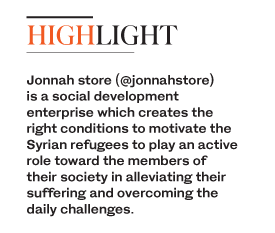
She is the founder of Kurt (@kurtstore), a social enterprise she founded in 2013 which supports local, disadvantaged women and teaches them tailoring so they can produce abayas as a sustainable means to fight poverty.
“We did not want to go back home without doing anything. When we returned to Saudi Arabia we recognized that I had experience in a sewing and clothing business and Fatimah had experience in volunteering work and she had the contacts, so we founded Jonnah.”
Al-Bassam and Aburas went to the camp in Jordan again in December 2017 to start the business.
They started with six refugees working in the factory, and the number later increased to eight. And they are willing to increase the number of benefitting refugees as they grow their business.
It took them three months to produce the first collection. They faced some obstacles at the beginning, one being communication with the organization at the camp, which has many other priorities.
“It’s hard sometimes, because they are a relief organization. They are not business oriented, so sending and receiving emails back takes some time,” said Al-Bassam.
Moreover, achieving the desired product quality does not happen immediately. Aburas said that raising a social enterprise has the same challenges as any other enterprise: Following regulations in the country, keeping a consistent production line, and maintaining quality. All of that needs continuous effort and faces some obstacles.
“You want a bigger impact, but to make the impact you have to go through everything,” she said.
However, there is an important difference between a social business and any other business.
“You make more profit, not in order to make more money, but you make more profit to help more people so you have a bigger impact. More money is just the tool,” Aburas said.
Sometimes people do not understand the concept of how social enterprises work. They may think that the refugee or the beneficiary receives 100 percent of the money they pay, but that is not how the business works. Everything has a cost and the company needs the money to keep going and benefit more people.
Jonnah Store goods are sold through Instagram, and they also participate in exhibitions. Al-Bassam and Aburas aspire to expand their project to reach more customers. They hope to launch their website, hire more refugees, collaborate with more designers, and cooperate with more companies in Saudi Arabia and in the world.
Jonnah sells female clothing in the meantime. In addition to Jonnah’s line of designs, it has expanded its business plan; Jonnah can be the interface between the designers and the factory at the camp.
“We would tell them: You are going to produce your collection anyway. Give us a sample and the material, and we will have your collection produced in Al-Azraq camp,” Aburas said.
“What really distinguishes Jonnah is that it has occupied refugees’ time and improved their social life as well. They gather in the factory every day from 8 a.m. to 3 p.m., learn new things and get to know their neighbors. They feel that they have a goal in their lives,” Al-Bassam said.
“I remember when we came back to the camp the second time, I found some volunteers wearing the clothes they worked on. They actually bought them from Jonnah.”
One of the seamstresses told them: “I have never been so proud of myself as I am now.”
Another one said: “Since I was in Syria I dreamed of sewing clothes for others. Now I see people wearing the clothes I made. I feel that my dream is coming true.”
For Al-Bassam, the issue is not only about having a sustainable income, but also about their psychology, in how what they do is reflected on their self-confidence and sense of hope.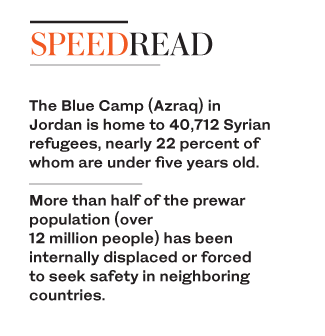
“You only need to be human to have empathy and compassion for the refugees,” she said.
“When we went to the seamstresses and tailors, we thought we were going to help them, but we found that we were the ones who drew strength and energy from them,” said Aburas.
Moreover, Jonnah received good feedback from custumers. “We had custumers who bought the clothes because they liked them, and we had those who bought from us as an act of compassion and benevolence. For example, some men would buy from us for their sisters and mothers,” she said.
Syria is the biggest humanitarian and refugee crisis of our time, a continuing cause of suffering for millions which should be garnering a groundswell of support around the world, said Filippo Grandi, the UN High Commissioner for Refugees.
The Syria crisis has accelerated more dramatically than any crisis on earth. Syrians continue to be the largest forcibly displaced population in the world, exceeding Afghanistan and Somalia by millions of people.
More than half of the prewar population has been internally displaced or forced to seek safety in neighboring countries. That’s more than 12 million people, including some 6.3 million people who have escaped across the borders.
According to the latest factsheet published in October by the refugee agency UNHCR, the Blue Camp (Azraq) in Jordan is home to 40,712 Syrian refugees, nearly 22 percent of whom are under five years old.
Opened on April 30, 2014, the camp stretches in a 14.7 square-kilometer area; 75 km away from Saudi Arabia’s national borders, and 90 km away from Syria.
The camp is managed in co-coordination with the Syrian Refugee Affairs Directorate and UNHCR.
Al-Bassam said that the refugee crisis is a combination of more than one problem. People in the camps not only lack basic needs of shelter and food, they have also lost their homes and experienced horrific events.
“I believe governments are not doing enough, and we as individuals are not doing enough. We can do a lot more. I always wanted to do something for them,” she said.
“As Jonnah, we go to the camp by ourselves to receive the goods, we meet with the staff and listen to their suggestions and complaints, and we pay them by ourselves,” she added.
“We do not want it to be just a business. Direct communication makes them feel our appreciation and attention, and that in itself makes us want to keep going.”
Mahmoud Darwish ended his poem with the following line: “As you think of others far away, think of yourself, say: ‘If only I were a candle in the dark’.”
Saudi women’s social enterprise protects Syrian refugees from hunger, thirst and loneliness
Saudi women’s social enterprise protects Syrian refugees from hunger, thirst and loneliness
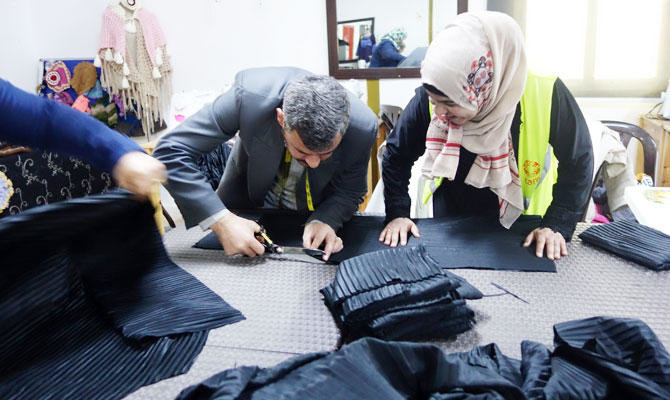
- “Jonnah” in Arabic means the shield. According to Al-Bassam, their store’s name is borrowed from a Hadith by the Prophet Muhammad (peace be upon him) in which he said “Fasting is a shield”
- Joined in compassion for the refugees, Al-Bassam and Aburas co-founded the Jonnah store
Saudi ministries sign deal to achieve goals in fields of culture, human resources
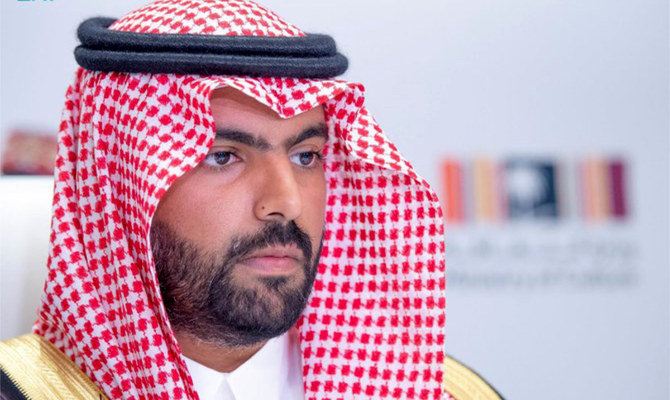
- Move aligns with aims of Saudi Vision 2030
RIYADH: Saudi Arabia’s Minister of Culture Prince Badr bin Abdullah bin Farhan, and the Minister of Human Resources and Social Development Ahmed Al-Rajhi signed a cooperation agreement on Monday aimed at achieving their respective goals.
The agreement will also work to develop human capital in the culture and arts sectors.
It is hoped the partnership will lead to the development of local cultural identity; the growth in local economic interaction; an increase in job opportunities and social development; and the creation of a legislative and regulatory environment that encourages investment and innovation in the cultural sector.
It is expected this will lead to increased economic activity and new job opportunities, targets which form part of Saudi Vision 2030, the Saudi Press Agency reported.
The ministries will study ways to encourage and motivate the participation of the private sector in developing the culture and arts sectors as part of the agreement.
Inaugural Red Sea Fashion Week to highlight Saudi talent to a global audience, official says
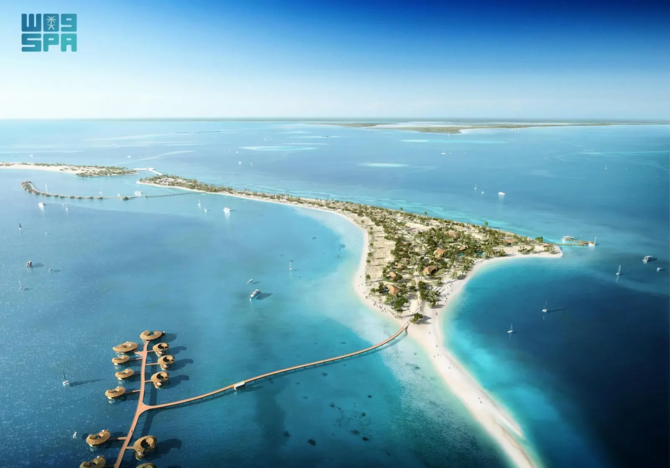
- ‘Initiative is a vibrant testament to our dedication to cultivating local talent,’ says Fashion Commission’s CEO
RIYADH: The head of the Saudi Fashion Commission said on Monday that the inaugural Red Sea Fashion Week later this month will highlight the talent in the Kingdom to a global audience, the Saudi Press Agency reported.
Burak Cakmak, the CEO of the commission, said: “With Red Sea Fashion Week we set out to forge a distinctive and dynamic platform that not only highlights the vast creativity and skill within Saudi Arabia but also elevates our nation as a key player on the global fashion stage.
“This initiative is a vibrant testament to our dedication to cultivating local talent and integrating them into the international arena, resonating deeply with the Kingdom’s Vision 2030 goals of enriching our cultural fabric and broadening our economic horizons.”
The first edition of Red Sea Fashion Week, the latest initiative from the Saudi Fashion Commission to promote the Kingdom’s fashion industry, begins on May 16 at the new St. Regis Red Sea Resort. It runs until May 18.
A fashion show will be held on the first day, followed by two days of side events and further shows featuring a collection of luxury fashion, jewelry, ready-to-wear items, and resort wear collections from Saudi and international designers.
Saudi Arabia hosted its first fashion week in 2023 in Riyadh, and hosted a pop-up event in Milan last year on the sidelines of the city’s fashion week.
Saudi crown prince expresses condolences to UAE president after death of uncle
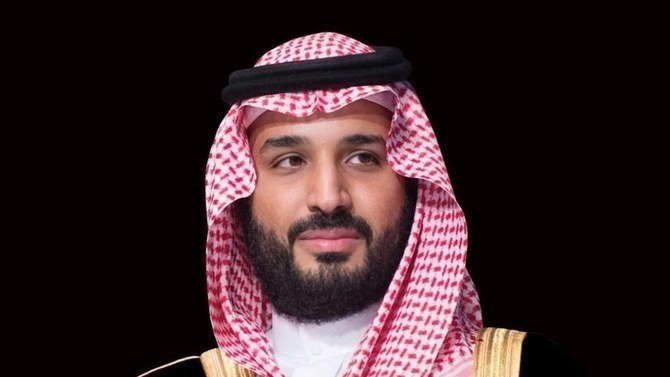
- Sheikh Mohamed thanked the crown prince and expressed his condolences over the death of Saudi poet Prince Badr bin Abdul Mohsen
RIYADH: Saudi Crown Prince Mohammed bin Salman expressed his condolences to the President of the UAE Sheikh Mohamed bin Zayed on Monday after the recent passing of his uncle Sheikh Tahnoon bin Mohammed Al-Nahyan.
During a phone call, the crown prince prayed that God forgive the deceased who was the representative of the Abu Dhabi Ruler in Al-Ain Region.
Sheikh Mohamed thanked the crown prince and expressed his condolences over the death of Saudi poet and national literary icon Prince Badr bin Abdul Mohsen.
Saudi justice minister opens International Conference on Judicial Training

- Experts from around world will attend 2-day event in Riyadh
RIYADH: The Saudi justice minister on Monday opened the International Conference on Judicial Training in Riyadh.
Walid Al-Samaani made the opening speech at the two-day event, which has attracted more than 600 experts and 45 speakers from around the world.
He highlighted the strides made by the Kingdom in the judiciary sector since the launch of its Vision 2030 initiative.
He also outlined the ministry’s commitment to improving the efficiency of the judiciary and “pivotal role of training, qualification and legal knowledge management in achieving justice.”
The Judicial Training Center was dedicated to improving the skills of the Kingdom’s judicial and legal personnel through collaborations with its partners and had been instrumental in qualifying judges and training lawyers, judicial assistants and notaries, the minister said.
Al-Samaani also commented on the transformation of the justice system, driven by Crown Prince Mohammed bin Salman, which has focused on fortifying legal principles, embedding values of transparency and ensuring legal certainty.
A key area for development was the digital transformation and integration of artificial intelligence, which the ministry was advancing to enhance judicial quality, he said.
Saudi Arabia, UK sign $5m deal to help fight malnutrition in Somalia
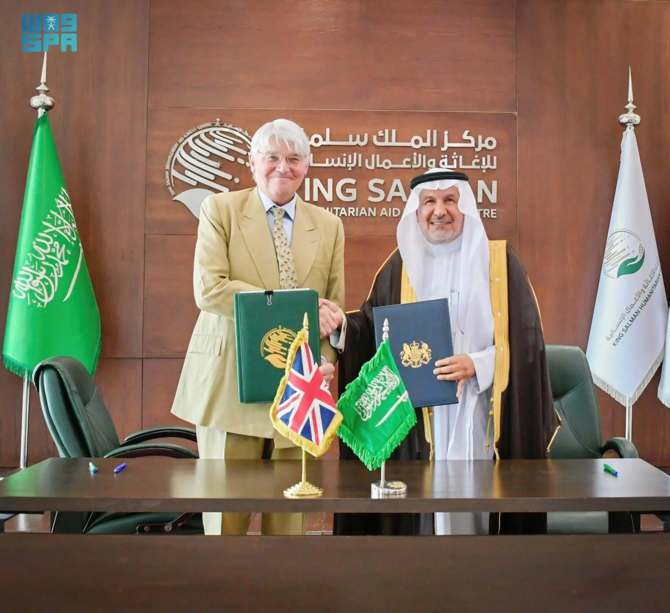
- Funds expected to benefit 101,000 children in high-risk areas
- Sides looking for further opportunities for collaboration, KSrelief chief says
RIYADH: Saudi aid agency KSrelief and the UK on Monday signed a $5 million cooperation agreement with UNICEF to help tackle malnutrition in Somalia.
The deal was signed by KSrelief General Supervisor Dr. Abdullah Al-Rabeeah and British Minister for Development and Africa Andrew Mitchell at the agency’s headquarters in Riyadh, the Saudi Press Agency reported.
KSrelief and the British Foreign, Commonwealth and Development Office will each contribute $2.5 million to UNICEF.
The funds will provide access to nutrition services, water and personal hygiene supplies in 15 high risk areas of Somalia, benefiting 101,000 children.
The deal is within the framework of joint humanitarian and relief projects between the Kingdom and the FCDO to alleviate the suffering of the Somali people.
The announcement was made as part of the second annual UK-Saudi Strategic Dialogue on Humanitarian Aid and International Development, which also discussed “providing more aid into Gaza and encouraging progress toward peace in Sudan,” the FCDO said in a statement.
The two countries have already committed $22 million in joint funding, delivering vital aid and providing famine relief and humanitarian support in Somalia and Sudan.
Other cooperation programs through KSrelief and the Saudi Fund for Development were expected to be delivered in Sudan, Yemen, Bangladesh and Ukraine, the FCDO said.
“We look forward to enhancing our technical experience and capacity building by building upon the strong foundation established during our previous dialogue, which presents an invaluable opportunity to solidify our future direction, explore new areas of cooperation and further demonstrate the transformative potential of our partnership,” Al-Rabeeah said.
“Officials from both sides are actively identifying promising opportunities for further collaboration. KSrelief sees immense potential to leverage our respective strengths in areas like health interventions, education infrastructure development and livelihood creation programs.”
Mitchell said: “The UK is working with Saudi Arabia and other partners to support those whose lives have been affected by conflict around the world.
“I am delighted to be in Riyadh to agree a way forward to scale up significantly joint funding which will go a long way to supporting those people and communities who need it most, building on today’s announcement in Somalia and looking to further support people in Yemen, Ukraine, Sudan, as well as the Rohingya refugees in Bangladesh.
“I also discussed the need to bring the conflict in Gaza to a sustainable end with my Saudi partners. The UK remains focused on achieving an immediate pause in the fighting, securing the release of hostages and ensuring aid reaches those who need it.”
In separate talks, Al-Rabeeah and Mitchell discussed matters of common interest related to relief and humanitarian affairs around the world, ways to enhance cooperation and topics included in the Second Strategic Dialogue for Development and Humanitarian Aid between the two countries.
The Saudi Fund for Development will also sign a deal with Mitchell during his visit to strengthen cooperation in line with the UN sustainable development goals.




